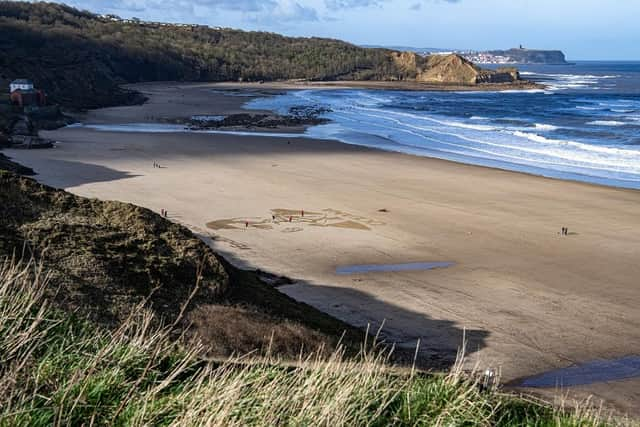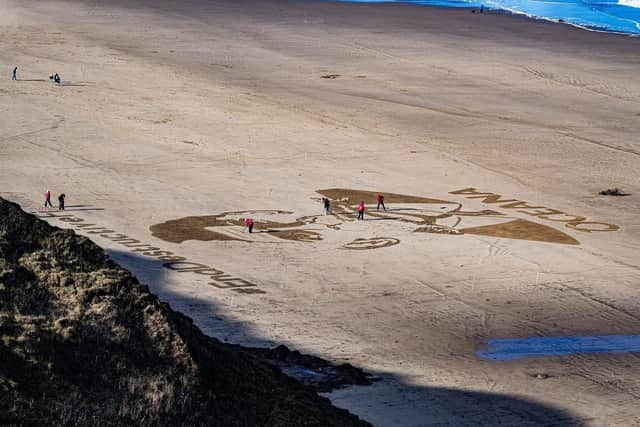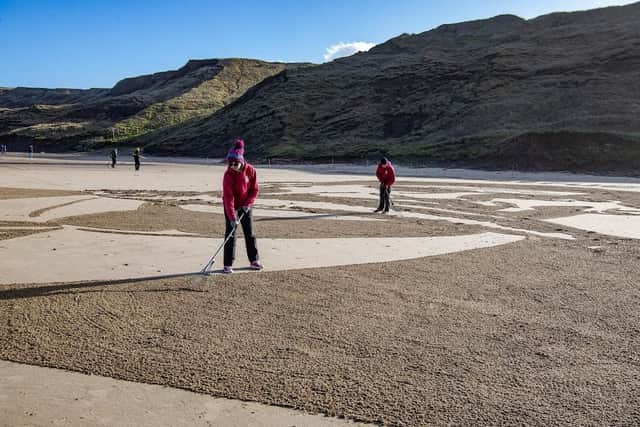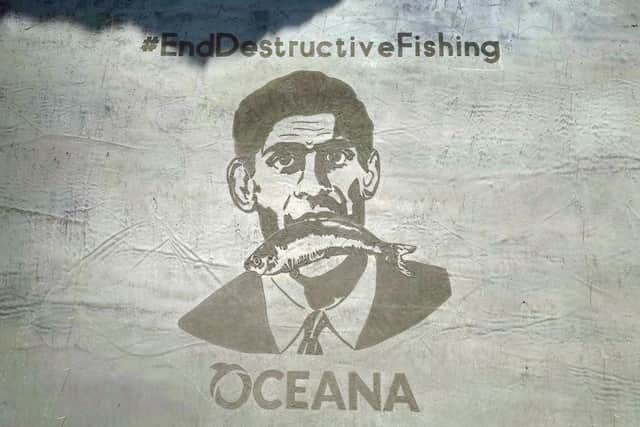Sand art stunt at Cayton Bay near Scarborough features Prime Minister Rishi Sunak with a fish in his mouth in response to the discovery that over 136,000 hours of industrial fishing took place at Marine Protected Areas in 2022
and live on Freeview channel 276
According to Oceana UK, the collective hours of industrial, and sometimes destructive, fishing amounts to more than 15 years’ worth of negative impact in Marine Protected Areas (MPAs). The new research shows that UK and EU vessels spent this time appearing to fish MPAs last year, with at least 7,000 hours involving destructive bottom towed fishing gear.
This action is considered a wilful negative impact to the ecosystem and biodiversity in MPAs when you consider these hours of simultaneous trawling as a linear period of time. Eight in 10 adults (80 per cent) believe UK laws to protect the ocean must be strengthened and more than three quarters (76 per cent) of British public agree that bottom trawling in marine protected areas should be banned.
Advertisement
Hide AdAdvertisement
Hide AdTo call attention to the issue, Oceana UK has commissioned Sand in Your Eye to produce a sand art installation portraying public frustration towards government inaction on destructive fishing. The findings have been published on Thursday, March 2, 2023, to coincide with ministers gathering in Panama for the global Our Ocean conference.


Oceana UK is calling on UK ministers to show real ocean and biodiversity leadership and ban bottom towed gear and other industrial fishing in MPAs by 2024 to meet the global target of protecting 30 per cent of the ocean by 2030. The collective analysis of data comes from Global Fishing Watch (GFW), along with European and UK registries of fishing gear types, shows almost one thousand (907) EU and UK fishing boats appeared to be active in offshore MPAs in 2022.
The time spent appearing to fish by EU and UK vessels, mainly industrial trawling boats, in MPAs has increased by more than 4,000 hours compared to 2021.
Executive director of Oceana UK, Hugo Tagholm, said: “Industrial trawling and dredging of the seafloor are the most destructive fishing techniques in use today.
Advertisement
Hide AdAdvertisement
Hide Ad“Our analysis exposes the appalling scale of apparent industrial fishing in UK marine protected areas in 2022, including destructive trawling. The British public are shocked at the government’s failure to properly protect sea life in these so-called sanctuaries. The research also makes a mockery of the UK’s position as leader of the Global Ocean Alliance and commitment to 30x30 at the recent UN Biodiversity COP15.


“As a minimum, we need to stop destructive fishing in marine protected areas and end the public deceit that these regions are safeguarded from industrial exploitation. We cannot stand for this bluewash any longer. The attack on ocean life must end.”
Oceana UK considers the issuing of fishing licences which permit bottom trawling or other industrial fishing in MPAs to be in breach of various nature laws including the Offshore Habitats Regulations, Marine Act and Fisheries Act.
According to Oceana UK, the government may be benefitting from the fact that many people do not understand the problem, as its survey shows more than one third of Brits have never heard of the term ‘bottom trawling’. After learning what it is and the issues surrounding it, three quarters of UK adults (76 per cent) agree that harmful seafloor trawling in MPAs should be banned, while the same proportion of the British public (77 per cent( agree that the UK government is failing to protect UK marine life.
Advertisement
Hide AdAdvertisement
Hide AdAssociate professor of marine ecology at University of Plymouth, Dr Emma Sheehan, said: “Oceana UK’s analysis proves industrial fishing is prevalent in the UK’s Marine Protected Areas.


“Industrial bottom trawling and dredging is a devastating practice which has extreme effects on seabed and biogenic habitats. These areas act as important nursery and feeding areas for essential marine life, including endangered species. The seabed also proves important ecological and environmental functions: filtering water, binding sediments and capturing carbon.
“We must urgently expand and enforce protection of these habitats. My research at Lyme Bay, one of the UK’s largest MPAs, where bottom trawling was banned, has demonstrated the incredible capacity for reef recovery and resilience when we protect these ecosystems.”
To communicate the British public’s disbelief at this scandal and frustration at government hypocrisy, Oceana UK has commissioned the sand art installation and strapline #EndDestructiveFishing. It took place at Cayton Bay, Scarborough, close to the Holderness Offshore MPA and Markham’s Triangle MPA which are yet to be protected from bottom trawling, but also Dogger Bank MPA where trawling has now been banned, highlighting best practice for MPA management to protect and restore marine life.
Advertisement
Hide AdAdvertisement
Hide AdOceana UK undertook a legal challenge in 2021 and the UK and Scottish governments agreed to proactively manage all offshore MPAs by 2024. However, there is still no commitment to ban bottom towed fishing activity in all MPAs and it is currently only banned through MMO byelaws in three offshore MPAs, along with one partial ban. In January 2023, Defra proposed byelaws in 13 MPAs, but these have been subject to criticism for only protecting reef features, where trawling is unlikely to take place.


Oceana believes all industrial fishing, particularly all bottom towed gear, should be banned from entire MPAs. According to the organisation, this could be achieved through a simple condition on the licences issued to industrial fishing vessels, prohibiting them from fishing in offshore MPAs.
Resolved to end destructive fishing and restore marine biodiversity, Oceana UK is campaigning for bottom trawling to be banned in all MPAs by 2024 and a minimum of 30 per cent of UK waters to be fully protected by 2030.
Comment Guidelines
National World encourages reader discussion on our stories. User feedback, insights and back-and-forth exchanges add a rich layer of context to reporting. Please review our Community Guidelines before commenting.
